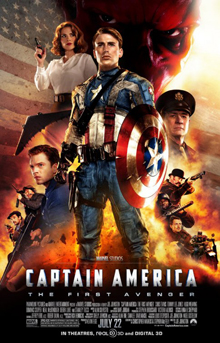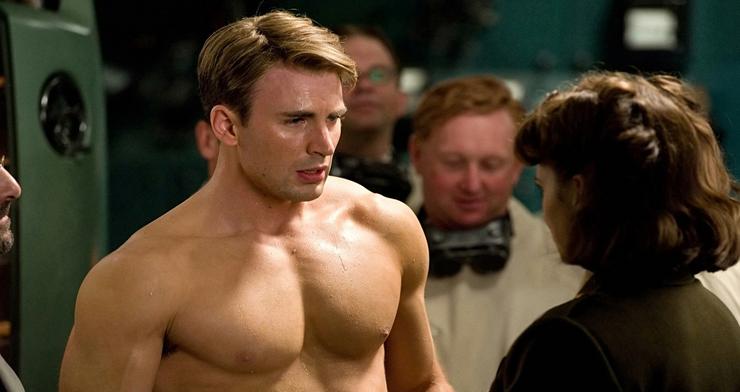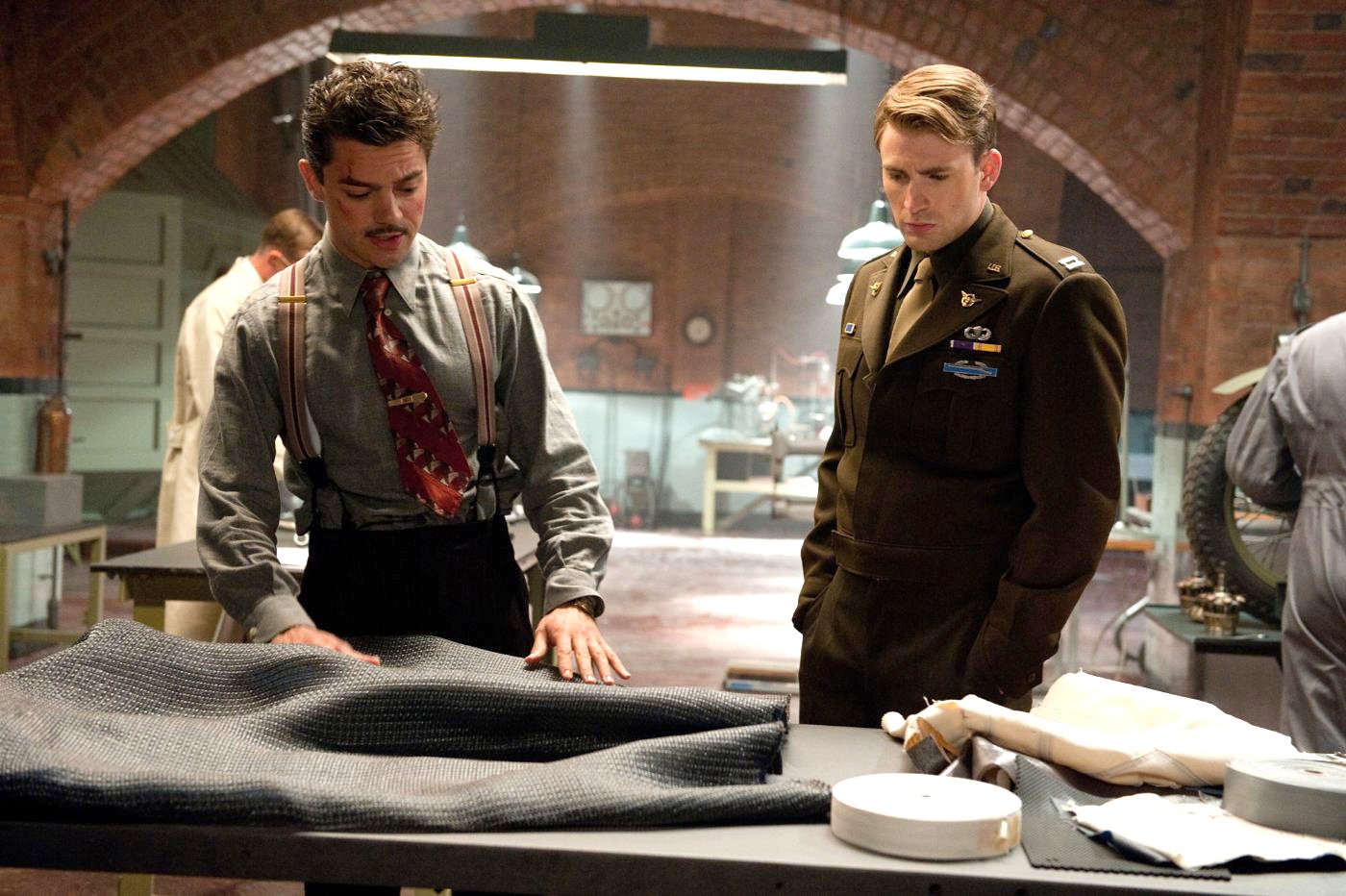 CAPTAIN AMERICA: THE FIRST AVENGER
CAPTAIN AMERICA: THE FIRST AVENGERFirst things first. One: you have in Captain America: The First Avenger, your requisite Stan Lee cameo. Two: there is something at the end of the credits, but unlike other Marvel films, it isn't a scene--it's a whole TRAILER. STAY AT THE END FOR THE AVENGERS TRAILER. Yes, we get a trailer for The Avengers, which from what I got from the audience was the most exciting part.
Those who stayed applauded, much to my disapproval. Honestly, who applauds at a trailer? Yet, I digress.
This season, we've had four, count them four comic book film adaptations, none of which I would call brilliant. Thor is barely passable (mostly due to the performances of Chris Hemsworth and especially Tom Hiddleston). I was perhaps too harsh with X-Men: First Class especially since in retrospect was better than what I remembered (almost exclusively due to the performances of James McAvoy and Michael Fassbender). Green Lantern was just a mess (made worse by the performances of Ryan Reynolds and...well, just about everyone with Ryan Reynolds). Now we have Captain America: The First Avenger (henceforth referred simply as Captain America).
As comic book films go, Captain America may not be the best one made (I'd argue for Superman: The Movie as the best of all comic book films) but for this year, it's the most unabashedly entertaining and aware of what it is: just a good time.
Steve Rogers (Chris Evans) is the prototypical 98-pound weakling. It's the height of World War II, but because of his physicality (he's short, scrawny, and has had a cacophony of illnesses), he is repeatedly rejected for military service. That is, until Dr. Abraham Erskine (Stanley Tucci) comes across him. Dr. Erskine, an exile from the Nazi regime, believes that Rogers has the most important substance: a desire to do good and a strong heart (strong as in passionate). With that, Erskine gets him into the Army, much to the disapproval of Colonel Phillips (Tommy Lee Jones). Dr. Erskine has developed a new serum that will turn this physically weak man into a muscular, super-strong man (and amplifying all the positive qualities Rogers has). Alongside Howard Stark (Dominic Cooper) and British agent Peggy Carter (Hayley Atwell), the experiment is a success.
Col. Phillips still does not have an interest in one man being his secret weapon, especially against the nefarious HYDRA: a super-secret Nazi scientific group whose leader, Johann Schimdt (Hugo Weaving) along with his scientific henchman, Dr. Zola (Toby Jones) wants world domination. HYDRA is so evil they outdo the Nazi salute: they use TWO raised arms rather than the wimpy one-arm version of the National Socialists.
They have taken prisoners of war and killed many more with a super-weapon of its own, while Rogers (now billed as Captain America) is forced to do USO and war bond tours. Determined to both prove his worth and rescue his lifelong buddy Bucky (Sebastian Stan), he single-handed raids a HYDRA munitions plant where he outdoes Sergeant York in killing and rescuing the men trapped behind enemy lines.
Phillips, still a bit leery, and Carter, now a bit smitten with the hunky and dear-hearted Rogers, decide to strike at HYDRA and Schimdt (whom we discover was Erskine's previous subject and also dastardly villain Red Skull, named for rather obvious reasons). Rogers leads his team on a daring attack at his secret lair (though not without personal costs). The battle between Red Skull and Captain America ends in a bit of a draw (Red taken to what I presume to be Asgard from Thor and Cap crashing the ship with the bomb bound for New York).
At Captain America's conclusion, he discovers the world of 2011 and Nick Fury (Samuel L. Jackson) telling him he's been 'asleep' for nearly 70 years.
The style of Captain America is purely 1940s, which is to its credit. In fact, if screenwriters Christopher Markus and Stephen McFeely had stayed strictly within a WWII setting and left out the present-day opening, the last scene would have been even more effective and perhaps more shocking. Still, they were wise to ground the film in a style reminiscent of the era it portrays because it puts the origins of Captain America in a stronger context.
I digress to say that if Captain America had been set today, say with Rogers being desperate to serve in Afghanistan or Iraq, the majority of audiences would have rejected the premise because those wars are not held to the same level as the Second World War. Nazis are much better villains than jihadists. With that being the case, Rogers' mad desire to fight is more relate able.
Credit should also go to Rick Heinrichs' art direction and Anna B. Sheppard's costume design, both of which were instrumental in making Captain America look and feel like something that did come out of a 1940s film. We even get a big-time, splashy musical number within the film, Star-Spangled Man, wildly reminiscent of something Busby Berkeley would have created for one of his elaborate musical numbers (I'm thinking something from Footlight Parade). The music and lyrics by Alan Menken and David Zipple respectively are endlessly catchy and peppy, which are perfectly appropriate to Captain America's overall feel as an unapologetic, rah-rah American film. As a side note, I think Star-Spangled Man has a strong shot of earning a Best Original Song Oscar nomination.
Granted, I thought the song, while quite jolly and well-done, made Captain America longer than it should have been as was incidental to the overall plot. While Markus and McFeely got the atmosphere right, I'd argue that we could have found another way to have the song as part of the story (say, a montage of Captain America in action as opposed to wearing his first costume, which while true to the character's original look now appears to have been done in mockery of it). In fact, the whole "send the Cap on a war bonds tour" subplot didn't add anything to the story except a chance for a big, splashy musical moment. It would have worked better if Captain Rogers (it should be noted he or anyone else around him never referred to him as 'Captain America') had been allowed to show his worth rather than have him go through another reminder of him being rejected.
I should point out that Captain America didn't set out to reinvent the wheel or the comic book formula. In truth, Captain America is a rather standard, by-the-numbers story: unappreciated man gains incredible powers, an evil villain wants to take over the world, the gruff superior doesn't think our hero is up to the job, said hero wins the battle and the girl. The film is smart enough to know what it is and not deviate far from the premise.
Director Joe Johnston is perhaps the perfect director for a film like Captain America--he relishes in capturing the visual world the story takes place, be it from his first feature (The Rocketeer, which is also an unapologetic nostalgia trip full of gee-whiz emotion) right down to the moody, Victorian look of The Wolfman (which I still think was an enjoyable film--not a good one, but enjoyable). Johnston got the feel of the 40s down quite well, and did a surprisingly good job with the actors.
However, that may do more to the fact that all the actors pretty much understood they were in two projects: Captain America the film and Captain America the long, long trailer for The Avengers (which according to the applause-worthy trailer at the end of this particular trailer will be out May 2012).
Think on that for a moment. Captain America tells it own story, but the beginning and end of the film serve as nothing more than a tie-in to this massive mega-franchise-tying film that will throw in characters from other Marvel films (Tony Stark's Iron-Man, the title character from Thor) and even some from comic books that have never had and probably won't have their own film (unless Jeremy Renner will be the star of a Hawkeye film, which I don't believe will ever be made). At least it will mark the first time the character of Nick Fury will actually be a major part of a film as opposed to just popping up in the post-credit scene (I argue he wasn't a big part in Iron-Man 2). Yet I digress.
Cooper was clearly channeling Howard Hughes for Howard Stark (right down to his mustache) but he had the charm and cockiness all Starks appear to have (even when their experiments go slightly awry). Tommy Lee Jones was his eternally gruff but oddly loveable Tommy Lee Jones type, while Weaving was having the time of his life playing Agent Smith, I mean, Red Skull. Few actors can do menacing as well as Weaving.
Tucci was sadly underused as Dr. Erskine, but he had a lovely Teutonic accent which at least was more believable than when Weaving or Toby Jones gave their German characters German accents. However, both Weaving and Toby Jones have a curious and pleasant double-act: one typically deranged and one slightly subservient to his master's will.
I wasn't too thrilled with the Dirty Dozen the good Cap brings along, not because there was anything wrong with having a multi-ethnic, multi-national team behind Captain America, but because we never got to know any of them (granted, the uber-geeks who know all the nuances of the characters would, but since I never read comics I wouldn't know a Dum-Dum from a Dernier).
I was more interested in Atwell's Carter, though their romance did seem to be more plot-driven than reality-based. In other words, one didn't understand how their love could grow so fast (especially when she catches our good Cap in a slightly compromising position with another woman--again, something that happens only in movies). Still, Atwell was one of the clear stand-outs in Captain America, and it's such a shame she won't be able to come back.
I'll say the biggest surprise was Chris Evans. I think he should embrace being an action star and not the actor he longs to be because he's a bit limited in his range in my view. I am not and have not been convinced that Evans is an actor. In Captain America, however, I was surprised to see him actually ACT, at least in a few scenes (such as after losing his best friend for example and when he's the scrawny Brooklyn kid). Once we get the Chris Evans we all know and love (the big, buff, hot guy), we get the Chris Evans we normally see (slightly stilted). However, there were some good moments.
As a side note, I found it curious that Captain America not only borrowed from other films (when the Captain first rides to HYDRA's secret compound, it was eerily reminiscent of when Hans Solo & Princess Leia went after the Empire's post on Endor in Return of the Jedi) but even made references to other films. Early in Captain America, Schmidt openly states how he's puzzled that the Fuhrer "digs for trinkets in the desert". Is this a subtle and sly reference to Raiders of the Lost Ark (for which Johnston co-won an Oscar for Best Visual Effects)?
As I've stated, Captain America knows what it is: both a gleeful homage to 1940s patriotism and a precursor to an even larger film. It is a nice, enjoyable, pleasant film. By no means is it a great comic book film and certainly not a great film in general. However, it knows what it is, embraces it, and as a result makes the entire experience a most pleasant one (even with the song). It does make one proud to be American.
Next Marvel Cinematic Universe Film: The Avengers
DECISION: B-





I would have to agree with your decision as a B-, this was one of those comic book movies where you didn't have to read the comic because the story behind Steve Rogers and how he became Captain America was quite well told. I do agree that the musical number could have been left out yet yes, it was pretty catchy. Good review and good grade for the film overall...can't wait to add this to my DVD collection.
ReplyDeleteThank you, though I confess the song has grown on me in the ensuing years.
Delete